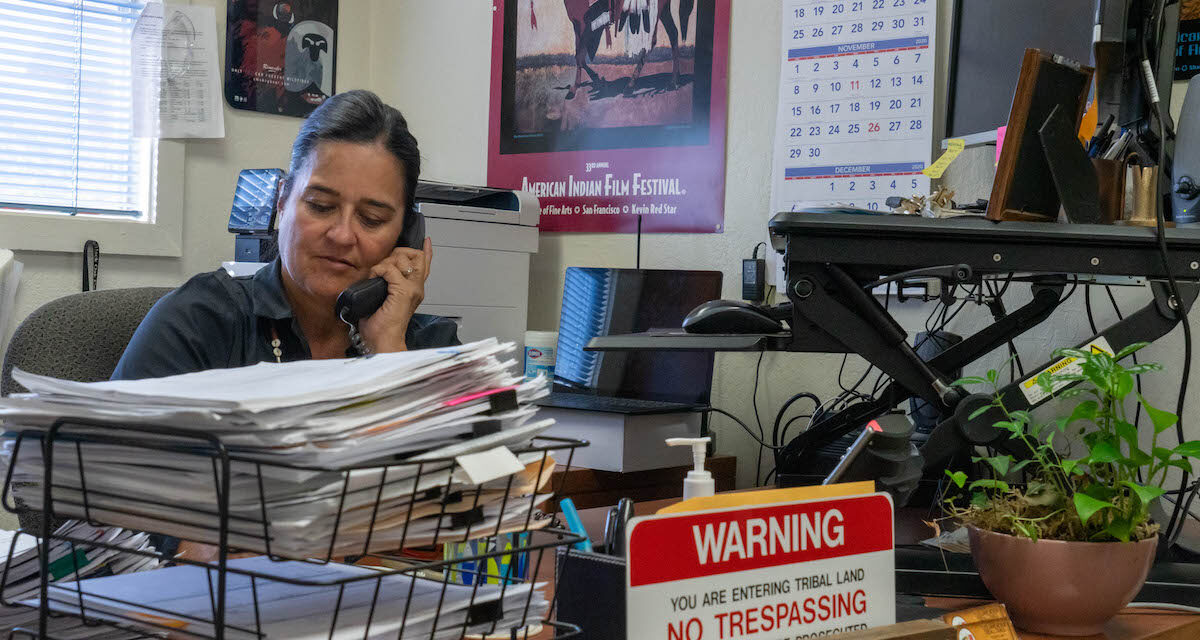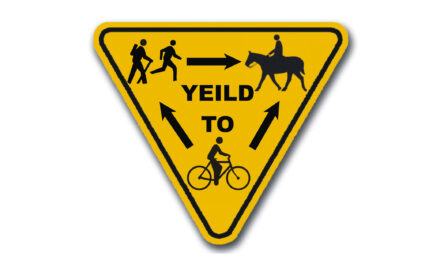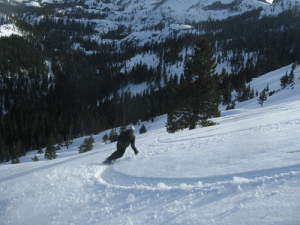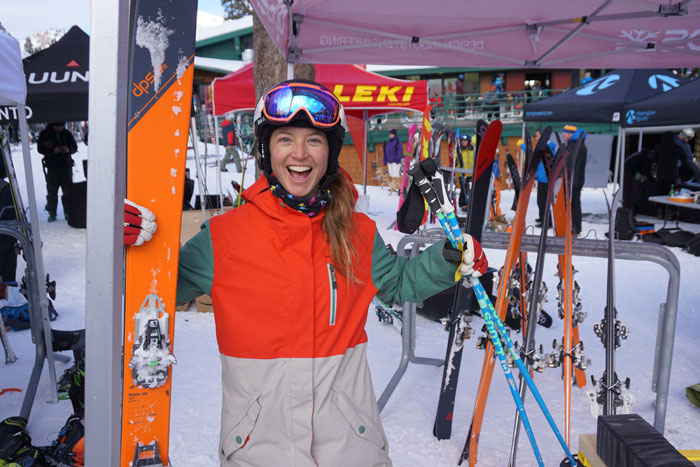- Changes Coming to the Alabama Hills National Scenic Area - 05/02/2021
- Dore Bietz - 01/27/2021
- Allyson Gunsallus - 11/02/2020
National Ski Patrol Representative and Indian Lands Consultant
Words and photos by Tracy Barbutes
Dore Bietz is an all-or-nothing woman who refuses to accept the word “can’t,” and whose subtle smile lines barely hint at her age. Quick to laugh, this self-assured, feisty, 54-year-old outdoorswoman is even quicker to lend a hand. “I just show up to the table,” she said recently. “I don’t wait for someone to invite me. I ask what I can do.” She emphatically believes in empowering others to help themselves.
As an Indian Lands Consultant, Bietz advocates for the return of tribal lands to original inhabitants, and as the Emergency Manager/Planner for the Tuolumne Band of Me-Wuk Indians, she works to keep members safe and well-prepared for emergencies. There have been no cases of COVID-19 on the Tuolumne Rancheria and she expressed satisfaction when mentioning the PPE she secured for tribal members.Daryl Whitcher, who has known Bietz since she was a National Ski Patrol candidate 15 years ago at the Dodge Ridge Ski Area, can attest to her grit, determination and altruism.
Her instructor, mentor and friend, said, “Six out of ten people didn’t get through the first year of training. That first year is tough. The first aid course is tough, and it’s going to be really tough unless you have some kind of medical skills.”
And Bietz didn’t have those medical skills. She confessed it didn’t come easy. While working full time, volunteering in her community and raising two daughters as a single mother, she studied relentlessly and passed all NSP tests (ski, toboggan, medical) her first year, on her first try.
“There was never any doubt in any of her trainers’ minds she would pass,” Whitcher continued. “You have to be able to drive a toboggan on any terrain, in any weather. We typically require 12 days of training, and if you don’t do twice that, you won’t pass. Bietz probably did 30 days her first year.”
Bietz freely admits she loves the exhilaration, and responsibility, that comes with being a ski patroller and in particular, working with a toboggan. She said, “I guess I like challenges. I love having to make decisions under stress.”
“It was pretty obvious from the get-go she was smart, driven and pretty interactive. After she was on patrol about a year, she became an instructor.” Whitcher added with a laugh, “As an instructor, her only problem is that she talks too much.”
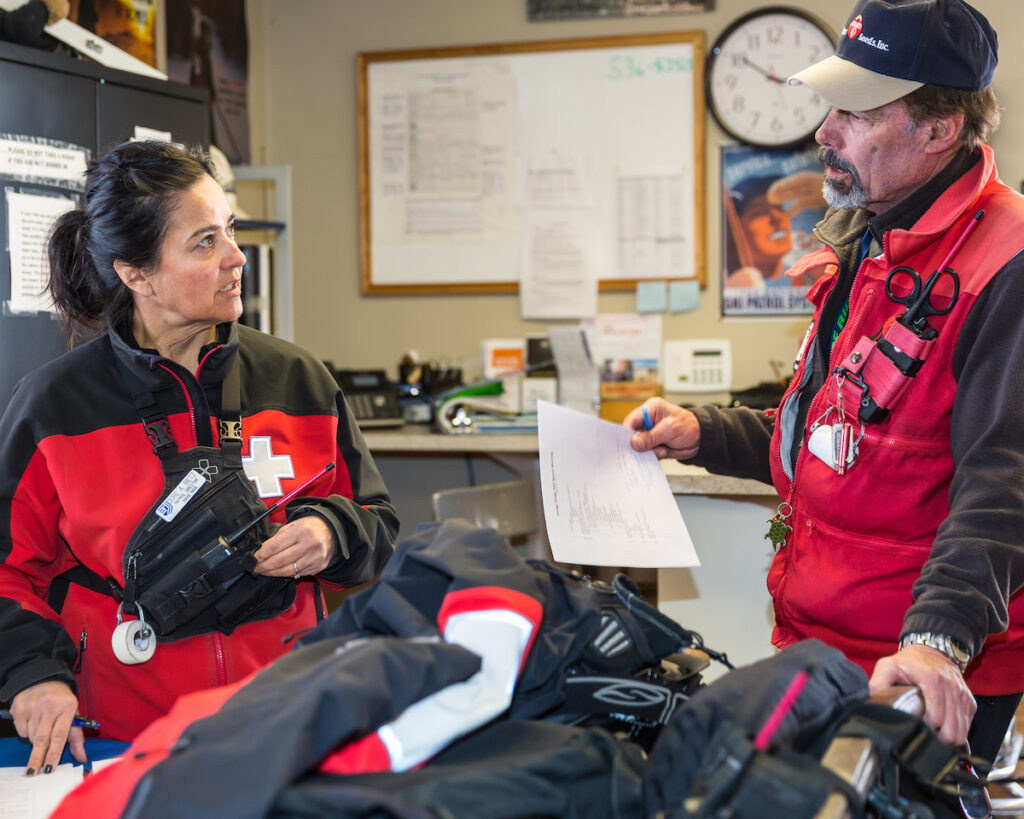
Tracy Barbutes for the Union Democrat
Dore Bietz (l) and Denny Giambastiani (r) discuss the day’s activities from ski patrol base at Dodge Ridge on Saturday, March 11, 2017.
He continued, “She is definitely in the top 5% of women in the national ski patrol in the Far West division. The NSP has 10 divisions throughout the US and Europe: the Far West Division includes California, Nevada, Arizona and Hawaii. She’s been an outstanding patrol rep and has worked on the women’s program, chairing it at the division level for about three years. She was asked to be a Patrol Rep chairperson for Kirkwood Ski Resort in the Eastern Sierra Region. We’ve never had someone from the Motherlode patrol move into another region.”
For four years, Bietz has commuted from Tuolumne to Kirkwood while acting as a secondary patroller at Dodge Ridge.
In 2018, she married for the first time, learning to lean on a partner, share in the decision-making process, and help in raising two young stepdaughters. She continues to work full time while actively consulting on tribal land issues and volunteering in various ways for tribal communities. Bietz chuckled, “I have to remind myself to slow down.”
She is currently involved on the divisional level in multiple disciplines. In 2012, after seven years as a member of NSP, Bietz was awarded the first runner up as a National Outstanding Patrol. Whitcher said, “It’s kind of hard to keep up with Bietz’s awards, but of course, she is not in this for the awards.”
So impressed with her work ethic, outgoing personality, instructional skills and ability to handle situations when “things get weird,” Whitcher nominated Bietz for one of NSP’s highest honors: a National Appointment.
Bietz received her National Appointment during the September 2020 Far West Virtual Awards. She is one of only six women from Dodge Ridge’s 70-year history to receive such an honor. Just 10,402 National Appointments have been presented in the NSP’s 82-year history.
Beckett Stokes, the NSP Marketing and Communications Director, said of Bietz, “It is fair to say that she is one of very few patrollers who has been recognized by her patrol and her peers for outstanding skill and service. Just to qualify, she had to patrol for a minimum of eight seasons, have achieved the highest level of training, and serve in a leadership role in her patrol or beyond.”
It should be noted, the NSP was formed in 1938, and women were first registered in 1941. Currently, there are roughly 31,000 members and approximately a quarter of those are women.
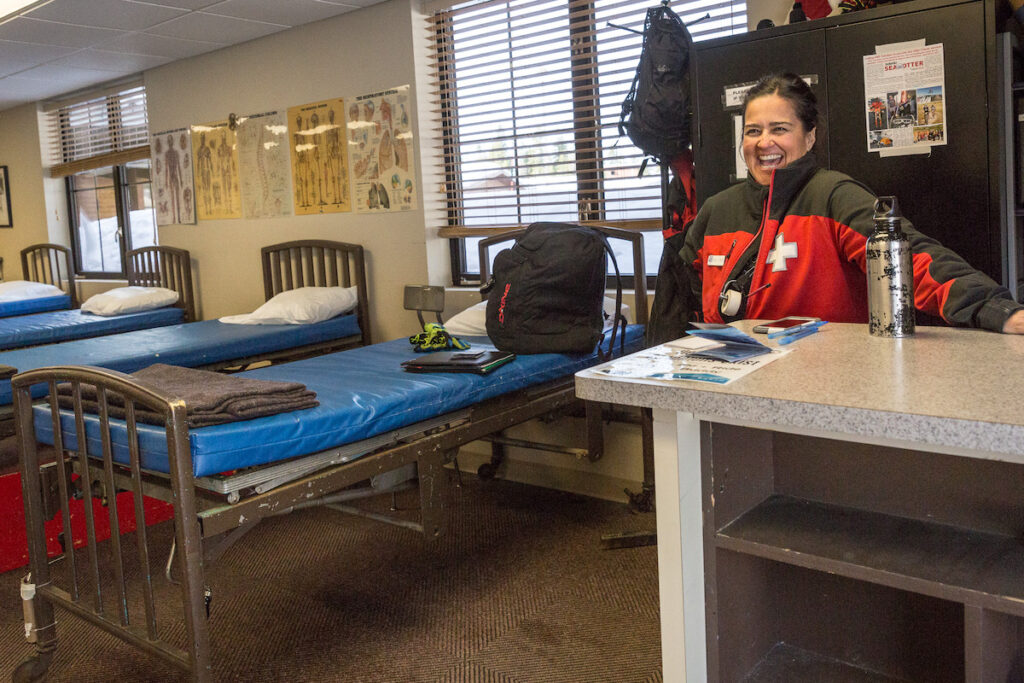
Tracy Barbutes for the Union Democrat
Dore Bietz, Patrol Director, Dodge Ridge, sits in the ski patrol center at Dodge Ridge Ski Area on Saturday, March 11, 2017.
Sierra Parada, Bietz’s youngest daughter, watched her mother receive her National Appointment via Zoom and said, “It was really cool to hear other people speaking about her. All of her hard work and passion is being seen by other people. It’s not an award that’s given to just anyone, it’s not given out lightly. It’s well deserved.”
She continued, “She’s in, all-or-nothing.” As a child, Parada said her mom “was there for us for school, homework, 4H, soccer, skiing, all of it. It amazes me that she was so dedicated to so many things. She did it all with such grace. Now, looking back, I didn’t notice as a kid, but it speaks to how she can take on so many things.”
When Parada and her sister, Shauta Collier, were young, they joined their mom at Dodge Ridge. They were put into ski patrol practice scenarios after completing their homework. They particularly enjoyed having splints put on. She said, “It was fun to be involved in that way.” Both girls joined a Dodge Ridge race team. Parada remains an avid skier, and Collier joined NSP briefly.
Awani’ lutum! (Me-Wuk phrase meaning “go outside and play”)
Bietz grew up in urban environments, including the San Francisco Bay Area, Reno/Tahoe and Denver, Colorado. While living in the Bay Area, weekends were often spent with her mother’s family on the Tuolumne Band of Me-Wuk Indians tribal land in the Sierra Nevada foothills – the Tuolumne Rancheria. She contributes much of her adult success to the exposure received by being immersed in two distinct worlds.
Her mother was an engineer with AT&T and her father was a San Francisco attorney, and both were avid skiers. They introduced Bietz, and her two siblings, to the sport at Tuolumne County’s family-run, 862-acre, 67-run Dodge Ridge Ski Area. Continuing the tradition, Bietz taught her two daughters, and most recently her two young stepdaughters, to ski there.
After graduating from East Bay’s Albany High School, Bietz attended Feather River College and joined the Golden Eagles ski team. “In Quincy,” she said, “it was seven guys for every girl, so the team was all men.” Except, of course, Bietz. Training on small slopes near Graeagle, as well as at Tahoe-area resorts, their school competed in an intercollegiate circuit that included teams from UC Davis, UC Berkeley and Fresno State.
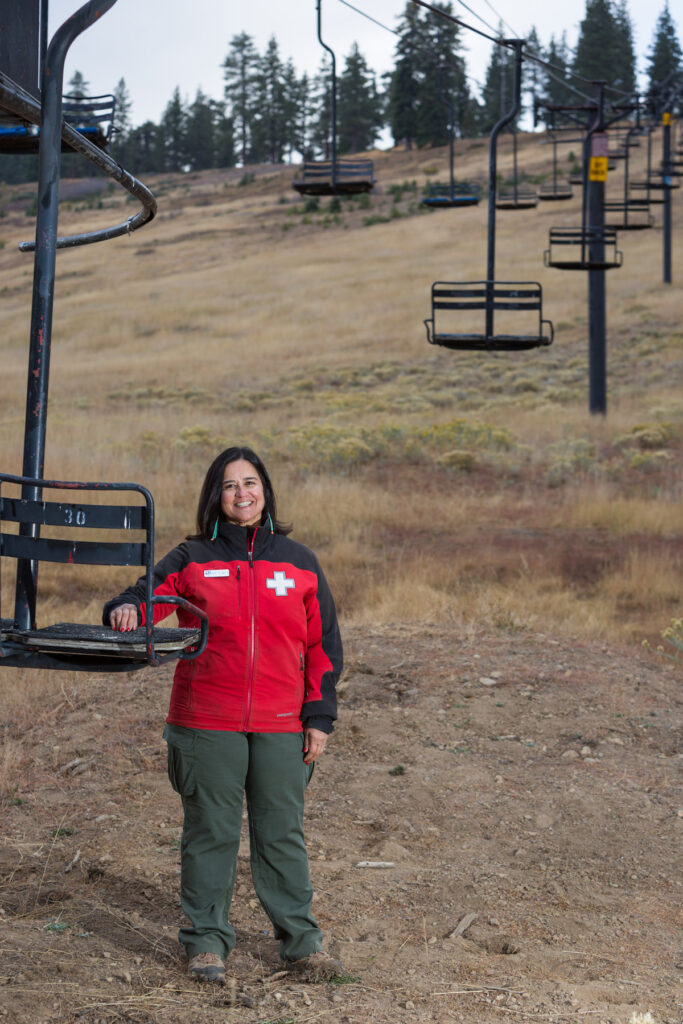
Sunday, October 25, 2020
Dore Bietz at Dodge Ridge Ski Resort for ASJ.
Bietz said, “I held my own. I beat most of the guys on the team.” It was during these two years that she “truly fell in love with skiing.”
Feather River summers were spent living with her grandmother and working in Yosemite National Park. Her grandmother was an interpreter in the park’s Indian Village. Bietz’s first summer was spent flipping burgers, as well as other less glamorous jobs. She became an interpreter at the Valley Visitor Center and Happy Isles Nature Center her second summer.
Following her AA degree in Social Sciences, Bietz moved to San Luis Obispo to attend Cal Poly, skiing only occasionally. She spent four summers working for William Randolph Hearst Jr., and his wife Austine, on their private San Simeon Ranch. Paradoxically, her father was a member of the prosecution team in the 1976 Patty Hearst trial.
Following graduation with a BS Landscape Architecture degree and a minor in public administration, a stint as a tour guide at Hearst Castle, and a pregnancy, Bietz returned “home” to the Tuolumne Rancheria to live with her mother, grandfather and aunt.
She said, “I needed to be near my family where I could get back on my feet with a six-week-old baby. I went on welfare; I had no choice. But, I’m one of those classic cases that used it and got back on my feet, finding a job and place to live. I think it’s important to celebrate the challenges we’ve had in our life. I think it’s what makes me who I am, being resilient as a native woman.”
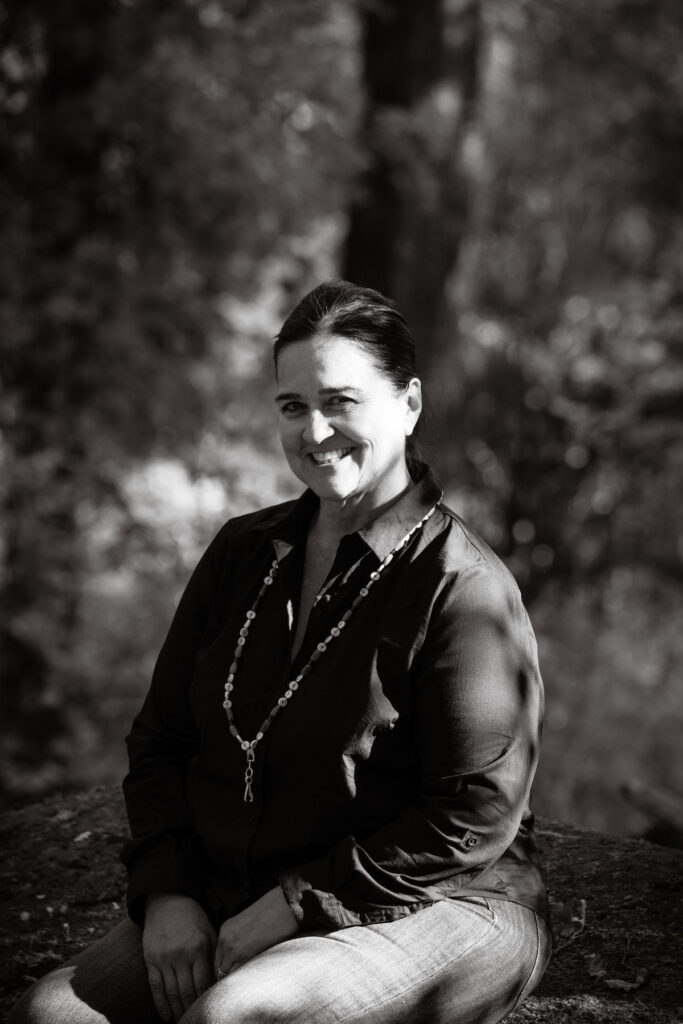
Tuesday, October 20, 2020
Portrait of Dore Bietz, member of the Tuolumne Band of Me-Wuk Indians, at the Tuolumne Rancheria of California, in Tuolumne, California.
Talngeni’ (Me-Wuk WORD That means “wake up!”)
Working as an Indian Lands Consultant for her tribe, and others, Bietz noticed many tribal organizations hired non-native attorneys who charged exorbitant prices with mixed results. She consulted with tribes who had no land base, and she dealt with demanding administrative documentation, quickly becoming an expert in native land trust issues. She continues to share her vast knowledge with others, empowering them to continue the work on their own. When the US was changing regulations in 1999-2001, she traveled around the country with other tribal leaders and testified before the US Congress in Washington, DC. One of her most satisfying accomplishments was in securing a housing project for the Santa Rosa Rancheria Tachi-Yokut Tribe near Lemoore, CA.
California has more than 100 federally recognized tribes, according to Bietz, and the largest native population in the country. Land that was traditionally occupied by California natives is now consumed by some of the state’s biggest communities.
Bietz stated, “Now, in some areas, when a tribe wants to purchase land, sellers will raise prices to one million an acre with nothing on it.” She said that tribes pay the price because it’s the only way to grow. They can’t exercise jurisdiction over their members unless the members are on tribal land, and they can’t provide for them unless they own land.
Bietz said, “Land is what we are culturally connected to.”
She would like to see more public land returned to tribes, as they are the natural stewards, having historically inhabited such places. She said there has been a slow movement for excess public lands to be offered to tribes first. “At the very least,” she said, “tribes should be considered in the management discussion of public lands.”
“I think outdoor recreation should be more inclusive and could be achieved by creating more opportunities for underprivileged and/or disadvantaged communities that normally would not have access. I also think that elementary schools need to create more educational opportunities in the outdoors.”
When asked how we can return tribal history to public lands, Bietz responded, “By institutionalizing that it must be covered, posted, discussed or mentioned in every walk, talk or publication.”
Switching gears, this engaging, focused and intense woman softened with an almost otherworldly look on her face and said, “Though I grew up in the city, I’m a mountain girl now. One of the things I love about ski patrol is being first on the mountain and laying fresh tracks in quiet solitude.”

